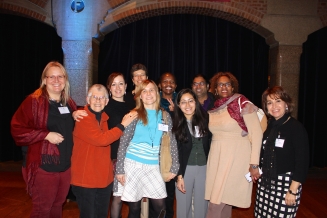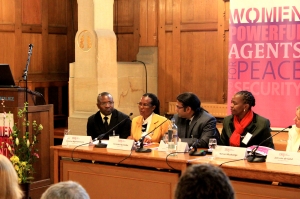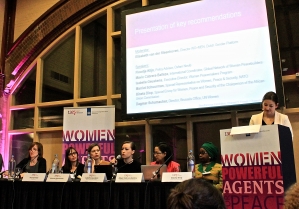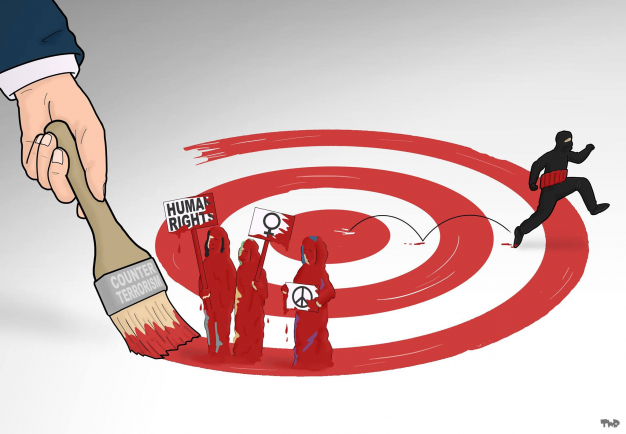Interview with Anand Pawar, edited and written by Thalia Malmberg
During February 16-17, the Ministry of Foreign Affairs of the Netherlands organized the Expert Symposium “Women: Powerful Agents for Peace and Security”. The Symposium was organized in cooperation with the signatories of the Dutch National Action Plan. The event aimed at providing input for the international Global Review of UNSCR 1325 implementation, taking place on the occasion of the 15th anniversary of UNSCR 1325, building on lessons learned from the implementation of two Dutch National Action Plans. The Symposium served as a platform to bring together representatives from Dutch and international civil society, governments, international organizations and academia to exchange knowledge and develop national as well as global recommendations on enhancing women's leadership and participation in peace and security. In this column, Anand Pawar, Executive Director of SAMYAK (India) and alumni of the WPP Pilot Training of Trainers on integrating a masculinities perspective in Women, Peace and Security (WPS) (2009-2010), reflects on the outcomes of the symposium.
WPP was actively involved in the preparation and organization of the Expert Symposium “Women: Powerful Agents for Peace and Security”, facilitating two parallel discussions in one of the three themes, namely "Masculinities and the role of men in implementing the UNSCR 1325 agenda". Together with WPP network members and institutional partners, ranging from grassroots activists to academics, we generated recommendations, specifically focusing on incorporating a masculinities approach in UNSCR 1325 implementation. These recommendations built on insights generated during WPP consultations in 2013 and 2014, such as the WPP Consultation on Gender and Militarism (June 2014).

The first expert session of this theme was titled “How can men be mobilized and activated for the UNSCR1325 agenda? How can we create supportand collaboration by using and understanding gender relations?” In this session, different approaches - from a masculinities perspective to an engaging men approach - were discussed. In addition, the experts discussed the impact of integrating such approaches in the WPS agenda, based on lessons from the field.
The second session was titled “Understanding gender roles and engaging men in prevention of conflict and addressing root causes of conflict”. This session built upon the previous session and took it one step further, from the personal to the political, examining the current peace and security framework from a gender lens. Experts discussed the opportunities and obstacles for including a masculinities perspective for the advancement of armed conflict prevention and non-violent conflict resolution.
Anand Pawar, Executive Director of SAMYAK (India) and alumni of the WPP Pilot Training of Trainers on integrating a masculinities perspective in the WPS agenda (2009-2010), actively participated in the symposium as speaker in the first parallel session, and as chair during the second session. He sat down with WPP after the Symposium to share his reflections on the two days.
“Five years ago I was involved in the very first introductory program by WPP in the Netherlands on masculinities. To see that in five years this is mainstreamed in an international symposium organized by the Dutch Ministry of Foreign Affairs is quite an achievement. From that perspective I think the Ministry taking this up as a key theme for the conference brings a lot of visibility to the issue, even within the field of UNSCR 1325.”
The Global Study, coordinated by UN Women, will also look at masculinities and mobilizing men for UNSCR 1325 implementation. The two sessions of the symposium provided an opportunity to feed in recommendations for this section, based on WPP’s track record and input of experts working on this issue for a long time in the field.
According to Anand Pawar, the sessions on masculinities were politically sharp. For many years, work on men and mascunities remained limited to the arena to sexual and reproductive health and rights. For over a decade, these issues largely dominated the field of practice. Broadening the discussion to conflict and using masculinities framework to analyze systemic causes behind conflict is a new arena that these sessions helped to further opened up. These sessions were also political because they discussed ‘unconventional’ issues like macro-economics, militarization and military budgets, intersectionality, class and race and its linkages with masculinity.
Anand Pawar argues that despite the progress, more must be done to facilitate information sharing between women’s organizations on these topics. For this to be possible, more investment can be made in interaction between the pioneers in the field of masculinities and organizations advocating for UNSCR1325.
 Time and time again the topic of masculinities versus engaging men came up during the parallel sessions. When addressing this issue, Anand Pawar says: ”Masculinities needs to be used as the framework of analysis. It should not be just the inclusion of men in UNSCR 1325. I see a great potential threat if we are not clear on what we are talking about. What we mean by the inclusion of masculinities is to start using masculinities as a political framework for analysis, to understand how meanings of manhood are historically associated with violence and power. How do we disconnect that? Working on masculinities might mean working on violent cultures through working on media and education. To work on peace, we need to transform the development policies, and at the same time we need to work on disconnecting the whole idea of being a man from notions of power and violence. Using a masculinities framework would help us understand how deeply power and violence is associated with the socialization of men. If not approached in this manner, we risk ending up having more men in conferences and men’s voices talking about Women, Peace and Security, instead of changing the gendered frameworks of peace & conflict itself."
Time and time again the topic of masculinities versus engaging men came up during the parallel sessions. When addressing this issue, Anand Pawar says: ”Masculinities needs to be used as the framework of analysis. It should not be just the inclusion of men in UNSCR 1325. I see a great potential threat if we are not clear on what we are talking about. What we mean by the inclusion of masculinities is to start using masculinities as a political framework for analysis, to understand how meanings of manhood are historically associated with violence and power. How do we disconnect that? Working on masculinities might mean working on violent cultures through working on media and education. To work on peace, we need to transform the development policies, and at the same time we need to work on disconnecting the whole idea of being a man from notions of power and violence. Using a masculinities framework would help us understand how deeply power and violence is associated with the socialization of men. If not approached in this manner, we risk ending up having more men in conferences and men’s voices talking about Women, Peace and Security, instead of changing the gendered frameworks of peace & conflict itself."
This also relates to the topic of accountability that was mentioned repeatedly during the symposium. A masculinities approach needs to be accountable to the women’s movement and build on the transformative elements present within the Beijing Platform for Action, based on a “do no harm” principle. As Cynthia Enloe, put it “Raising masculinities as a topic for research and basis for activists' interventions should only be done in a way that it does not defuse UNSCR 1325, it should make UNSCR1325 sharper, it should make doing UNSCR 1325 harder. It should be done in a way that doesn’t take away the difficult political agenda that is UNSCR1325”.

Multiple recommendations were given during the sessions. An example of a recommendation from the WPP-led session included that there should be an increase in programs for young people on masculinities, as they are vulnerable to being manipulated into extremist/violent identities. Another recommendation is to invest in diverse peacebuilding approaches, which have nonviolence at the center, and not only in “hard” peace and security approaches.
A recommendation going into the Global Study serves its purpose, but Anand Pawar emphasized that the focus should also be on how we mobilize ourselves to advocate for the implementation of those recommendations. Merely being part of the Global Study recommendations does not move to action on its own, it needs a vehicle, and civil society organizations have that potential. This is also where the question of adequate funding comes up. This topic was discussed at length during the symposium. As Anand Pawar states, “these vehicles need to be supported. These innovative approaches, especially by small civil society feminist groups working on UNSCR 1325, need to be solidly backed by money, otherwise the initiatives will always remain small, and it will be harder to show the wider impact”.
The Dutch Ministry of Foreign Affairs will publish the official final version of the recommendations produced during the symposium at the end of March.
Watch the video with impressions of the 1st day of the Symposium
Read the Publication "Sparks of Change - Inspirational Stories From Men and Women Working on Women, Peace & Security", launched at the symposium.
11 Dec '17 This month WPP staff interviewed Arbia Jebali and Sarah Chamekh from Free Sight Association in Tunisia about the work their organization does, how civil society space has changed over the years, which challenges they are facing now, and how civil society in Tunisia is organizing itself to overcome those challenges.
7 Nov '17 In this article, WPP staff interviewed Doron Joles of XminY Fund, an activist organization that supports social movements, action groups and changemakers fighting for a fair, democratic, sustainable and accepting world. He discusses the unique way they have chosen to hand out funds, and the challenges that go along with funding small activist organizations in the current global climate.

25 Oct '17 This Friday, the UNSCR 1325 Open Debate will take place once again, seventeen years since the adoption of landmark UN Security Council Resolution 1325 on Women, Peace and Security. In this article WPP staff reflects on the progress made for a truly transformative feminist peace agenda until now.
